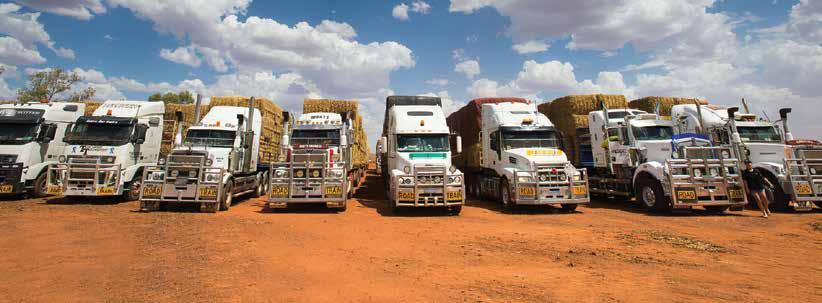
3 minute read
WA Farmers and the transport industry continuing to help the drought stricken
Image: Farmers across Borders
The kindness of West Australian farmers and our transport industry in helping drought stricken farmers Australia wide has been heart-warming for not only the recipients and those involved in making it happen but for the general public who in these days of ‘doom and gloom’ are reminded of the strong Aussie Spirit, mateship and the lengths good people will go to, to help others in need.
Advertisement
One such organisation is Farmers Across Borders which was born in 2014, when founders Sam Starcevich and Anne Bell local farmers from the Esperance region decided to help drought stricken farmers in NSW. After a bumper season of their own, they organised 16 road trains of donated hay from fellow WA farmers to be delivered to Bourke and Lightning Ridge in NSW, in conjunction with Burrumbuttock Hay Runners.
The 2014 Hay Run was the start of lifelong friendships built on a common theme of wanting to help fellow farmers in need. All involved said they would put their hand up again if needed.
A call was made in 2018 and so plans commenced to do it all again. On Australia Day 2019, 47 road trains made the trip with over 3,000 bales of feed to Cobar, NSW. The feed was distributed to around 300 farmers in NSW, QLD and VIC. This time, Farmers Across Borders worked in conjunction with Lions, Need for Feed. On 25 January 2020, Farmers Across Borders embarked to help again - this time to Meekatharra in Western Australia - to deliver much needed hay to those in the Murchison region.
All hay and feed is donated by generous West Aussie farmers, all eager to help their farming and grazier neighbours struggling
WATM • March 2020 in drought. The common thread remains by all – farmers and transport operators alike - there is nothing more fulfilling than helping others in need. To donate and assist in future Hay Runs please visit: www.farmersacrossborders.com.au
Waste and resource recovery companies are invited to assist in turning rubbish-mountains into business opportunities.
The Australian Academy of Technology and Engineering (ATSE) is calling on people at the frontline of waste and resource recovery to share their thoughts on how technology can best address the country’s worsening waste crisis.
Fires at rubbish stockpiles, the collapse of a major recycling company, shrinking export markets, and public concern over plastic litter’s effects on wildlife are all contributing to a growing sense of urgency around how to tackle rubbish problems.
To zero in on solutions, the Academy has launched a project to investigate the readiness of the waste management and resource recovery sector to adapt, adopt, or develop technologies that will enable it to address the challenges and opportunities of the next decade.
Businesses in the sector are being asked to give their opinions and ideas through an online survey.
Australia generates about 67 million tonnes of waste per year. Technological change means rubbish is an economic opportunity, with 9.2 jobs created for every 10,000 tonnes of Will Australian waste management be technology ready in 2030? material recycled.
ATSE has identified four technologybased solutions that could help the sector make the most of these opportunities over the next decade: • Improved product stewardship, where the consumer, manufacturers and the waste sector work together to reduce waste. • Design for disassembly, which makes products easier to repair, repurpose, and recycle. • Smart waste management systems, which use advanced technologies to sort and process materials, or technologies that make it easier for consumers to play their part, such as “pay as you throw” automated levies. • Advanced resource recovery solutions that use technologies to recover energy to produce electricity, heat, gas and fuels from waste. The survey is accessible at www. surveymonkey.com/r/DGQRRVF and open until the end of March 2020. This investigation is part of a wider threeyear research project funded by the Australian Research Council, examining the technology readiness of different industry sectors. The report generated following the consultation will provide a blueprint for waste management planning to 2030.










